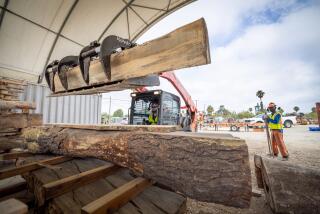Taylor Guitars buys ebony mill, pitches sustainable wood
- Share via
Ebony and other exotic woods coveted for building musical instruments are also among the world’s most endangered and protected, a fact highlighted when federal agents raided Gibson Guitar Corp. factories in search of illegally imported materials.
Southern California guitar impresario Bob Taylor thinks he has a solution: Buy an ebony mill.
“We are living in a time when almost all of the wood species we use in guitars are stressed beyond belief,” said Taylor, who co-founded Taylor Guitars in 1974. “It’s almost like we have an obligation to do this.”
Taylor and longtime business partner Kurt Listug have purchasedCameroon’slargest ebony mill for an undisclosed sum.
Taylor is the guitar manufacturer’s president and its design specialist; Listug is chief executive and the financial specialist. They and a Spanish partner see more than just a business opportunity, Taylor said — they’re working to change how ebony is harvested and processed.
They’re also taking on what may be an even more difficult task: convincing guitar buyers that variations in wood color, often perceived as flaws, are actually signs of sustainably harvested ebony.
“The people of Cameroon can’t afford the luxury for us to be this picky,” the professorial Taylor urged customers in a video posted on the website of the El Cajon, Calif., guitar maker. “Let’s embrace what the forest can offer us right now.”
Ebony is the wood of preference for the fingerboards of guitars and other stringed instruments. Once fairly widespread in the Americas, Africa and Asia, most mature ebony trees in India, Sri Lanka, Indonesia and Madagascar have been removed, according to Greenpeace, which blames the depletion on global demand from a variety of industries combined with poor forestry practices.
The music business and other industries have joined Greenpeace over the last several years in a campaign to protect forests and certify environmentally responsible logging. Several types of premium wood are at risk around the world, the group says.
In the case of ebony, for example, if a tree is cut down and if the wood isn’t the deep black that customers prefer, “they just leave it. To them, it’s no good,” said Scott Paul, who ran Greenpeace’s forest campaign for 14 years before leaving recently to take a job at a biotech company where he is exploring alternative uses for bamboo.
Although environmentalists applaud Taylor Guitars’ intentions in Cameroon, Paul said, “there’s a lot of skepticism that someone can just come into a country and finally do it right.”
Importing wood has become more complicated since U.S. lawmakers voted in 2008 to expand the decades-old Lacey Act to ban wood that was harvested or exported in violation of a foreign country’s laws. The idea was to protect endangered forests as well as the U.S. forest products industry.
That’s the law that the Justice Department and the U.S. Fish and Wildlife Service cited in the Gibson Guitar raid last year and in 2009, seeking what they alleged were illegally imported exotic woods — rosewood from India in the latest case and ebony from Madagascar in the earlier raid.
Gibson has said that it didn’t violate U.S. or foreign laws in importing the wood and has mounted an aggressive campaign to clear its name, arguing that the Lacey Act is being unevenly applied to complex international tariff questions. Company executives say they want federal officials to create a system to certify whether imported wood complies with the act.
For Taylor Guitars, which has used ebony from Cameroon for many years, the chance to ensure a steady supply of legal ebony was too good to pass up, Taylor said in an interview.
The company teamed late last year with Madrid firm Madinter Trade, which sells tone woods for musical instruments, to buy the Crelicam mill outside of Yaounde, the capital of Cameroon. The purchase wasn’t officially announced until late last month.
Taylor said it’s been a difficult process bringing the mill’s wood sourcing and operations up to what he and his partners consider acceptable. The mill’s subcontractors, for example, typically cut down 10 trees to find one with all black wood, Taylor said. He agreed to boost their pay to get them to deliver that ebony that had been considered undesirable.
“Acoustically, there is no difference,” Taylor said.
The manufacturer had to familiarize himself with Cameroon’s complex logging permit system and its complicated labor laws. And he set about upgrading working conditions and salaries.
“We had 75 employees who hadn’t had a pay raise in 12 years,” Taylor said.
Obtaining more electrical power for the mill meant he had to buy the transformer, the poles and the power lines.
“Then they will sell the power to us,” Taylor said. “Now we are starting some heavy capital investment.”
The mill currently processes large chunks of wood into boards, but Taylor has a vision of the mill producing parts that musical instrument makers and others, such as knife manufacturers, can use with perhaps only a little further customization. That will require new machinery and training, he said.
“We are going to start doing a lot of the processing and that will provide more jobs and more higher-paying jobs and triple the value of what they can sell, instead of just the raw material,” Taylor said. “There is money in the ebony, and they deserve to have more of that.”
More to Read
Inside the business of entertainment
The Wide Shot brings you news, analysis and insights on everything from streaming wars to production — and what it all means for the future.
You may occasionally receive promotional content from the Los Angeles Times.










